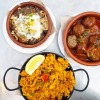Chinese New Year falls on the second new moon after the winter solstice, which this year is on the 31st of January. In Cantonese-speaking Chinese communities everywhere, people greet each other with a hearty Kung Hei Fat Choy! to bring prosperity to the new year.
Chinese New Year is the most intensely celebrated festival in the lunar calendar. It is important that the year starts right, as the beginning of the year influences what comes next. Kung Hei Fat Choy! 恭喜發財 literally means wishing you to make a fortune. While I think the English greeting Happy New Year contains the essence of all good wishes and is an excellent example of less is more – happiness is ultimately what matters most – the Cantonese prefer to be more specific.
Kung Hei Fat Choy! can be followed by good wishes that are relevant to the recipient, and there are dozens of commonly used ones to choose from. Just like receiving gifts that have been thoughtfully chosen, receiving a good wish for a desired thing is a joyful feeling indeed.
A Chinese New Year greeting for women: may you be forever young 青春常駐; a greeting for the career ambitious: may you have unobstructed ascent to the very top 平歩青雲.
The first time that we see children in the new year – one’s own children whatever their age, and the unmarried offspring of family and close friends – we give them small red envelopes with money inside for good luck. There are wishes for them too – be healthy 快高長大for the very young and do very well 步步高升for the others.
Desirable things are not only wished to others. Good wishes written in brush and ink calligraphy or neatly printed on pieces of red paper would be prominently displayed around the home to bring the desired blessings to the family. Red is the colour of celebration and good luck.
Cantonese new year customs are a practice in the power of positive thinking and the belief that more is more. In addition to saying, hearing, seeing and giving – good wishes are also delivered via food. An ingredient with a name that sounds like something desirable is used to increase the chances of achieving the hoped-for outcome. Because it is a monosyllabic language, many Chinese words have the same or similar pronunciation. This is a feature that allows much play on words, although not across dialects. For example, two words might have the same pronunciation in Cantonese but not in Mandarin.
Many Cantonese restaurants offer a celebration menu throughout the new year period. When a dish is brought to the table, a well-trained server announces its fortune-bearing name to the guests. Banquets to celebrate the new year are held throughout the first month of the lunar new year, especially for business entertaining. Dishes typically include expensive ingredients, not only as a sign of respect for the guests but also because it is important to the host – being lavish in entertaining encourages prosperity to continue.
Families that enjoy celebrating the new year in traditional ways eat food with names intended to bring blessings of good health, success, prosperity, happiness, togetherness and harmony.
Here is an example of a Chinese New Year dinner in a Cantonese family. Literal translations of the names of the dishes will not convey their meanings so I will not attempt it, except for the key word that associates the name with the key ingredient. The association of a blessing-bearing name with a dish is completely at the discretion of the cook. If you have the occasion or the interest to make such a dinner, you do not need to prepare these same dishes; as long as you use the same key ingredient, you can give the same name to your own creation.
I would like to convey my wishes to you, too, via this virtual celebration meal.
May you have:
美景生輝 Fantastic opportunities to show off your talents
Soup of ox tail, tomatoes, carrots, potatoes, onion, dried tangerine peel, ginger
Key word: 美, beautiful. Key ingredient: tail 尾
A Cantonese family meal on any important occasion such as new year, mid-autumn festival or a birthday includes a soup that takes hours to simmer. These soups are believed to have health-enhancing properties. The addition of dried tangerine peel and ginger is what makes this ox tail soup Cantonese.
龍馬精神 Abundant energy and good spirits
Lobster in a ginger, spring onion, garlic, and black bean sauce
Key word: 龍, dragon. Key ingredient: lobster 龍蝦
Lobster in Chinese literally means dragon prawn. The dragon symbolises power and vitality. The name of this dish can be used in any preparation that contains lobster.
喜氣洋洋 Many celebrations and joyful occasions
Filet of lamb stir fried with leek, garnished with red chilli
Key word: 洋, abundant. Key ingredient: lamb 羊
This is an everyday dish given a festive name. It does not require any special ingredients and is super easy to make – see Diana’s Stir Fry 1-2-3 for how-to. If you would like to get into the spirit of Chinese New Year but not cook Chinese food, then you can give the same name to roast leg of lamb, grilled lamb chops or any dish with lamb.
金玉滿堂 Money money money
Chicken stew with lily buds, hair moss, dried mushrooms on a bed of silver fungus and lettuce
Key word: 金, gold. Key ingredient: lily buds 金針
If I was unable to make a special trip to a Chinese grocery store to buy lily buds, silver fungus and hair moss, all three of which have names associated with money, I could make a stew of chicken and pumpkin 金瓜 instead. Lettuce 生菜 is also a fortune-bearing ingredient in this dish; it rhymes with money grows 生財.
花開富貴 More and more money
Broccoli with a sauce of crab and salmon roe
Key word: 花, flower. Key ingredient: broccoli 西籣花
The name of this dish literally means blossoms and wealth. It is customary to have colourful fresh flowers in the home during Chinese New Year. While the crab sauce is delicious, white is not a celebratory colour and something red is needed as a garnish. When it is not possible to get crab with red roe, I scatter salmon roe over the sauce instead.
幸福團圓 Many blessings and harmony in the family
Sweet dumplings with sesame filling in a brown sugar and ginger broth
Key word: 圓, round. Key ingredient: round dumplings 湯圓
A circle symbolizes completeness and perfection and such a dessert is associated with a sweet life. It is customary to eat this kind of dumpling on the evening of the first full moon of the new lunar year, when couples celebrate being together.
The new lunar year’s first full moon happens to be on 14th February, Valentine’s Day. What a good occasion to offer and share a variety of chocolate truffles!
If you like the idea of consuming a blessing-bearing dinner but find the logistics of preparing a six-course Cantonese meal daunting, try combining two or more key ingredients in the same dish and get the same outcome with much less work. Here is an example of a three-course menu:
龍馬精神 美景生輝 Abundant energy and fantastic opportunities: a starter of lobster tail
花開富貴 喜氣洋洋 Prosperity and numerous joyful occasions: a main course of broccoli and lamb
幸福團圓 Blessings and harmony: a dessert of a perfectly round scoop of ice cream
May you have all of the above in a Happy Chinese New Year: good health, good luck, success, prosperity and harmony.









Please leave a comment - I love hearing from you!11 Comments to "Kung Hei Fat Choy! Happy Chinese New Year!"
This is a great guide Kavey! 😀 I hope you have a very Happy New Year!
Thanks Lorraine, happy new year to you too!
Lorraine, thank you! Several years ago a friend sent me a link to your website, and I discovered the world of blogs on food and cooking. Very honoured that you have read my blog. I wish you great success with many visitors 客似雲來.
Diana has cleverly selected the ingredients of the dishes and named them appropriately to match the festive spirit of the Chinese New Year.
Can I have the Money Money Money stew all to myself please! I’d love to have a proper banquet like this one time.
Lovely post and happy new year!
It would be a real feast!
Happy new year, may all your wishes come true and everything is even better than you had wanted 萬事勝意.
Fascinating! Having lived in Hong Kong for a while some years ago, I witnessed some of this, but I perhaps never understood the full significance of some of the things I saw. It would be interesting to get a Chinese person to give a “fortune analysis” of our traditional Christmas Dinner!
Ha, yes that would be interesting — picking out the key ingredients associated with various blessings…
Mark, Christmas dinners are wonderful celebrations of togetherness and abundance. May everything turns out really well in the new year for you 如意吉祥.
Diana Kung Hei Fat Choy to you too. You have put meaning to the things that we do during CNY. We used to just follow our mother and mother-in-law, CNY will now have much more meaning. Thanks for the post.